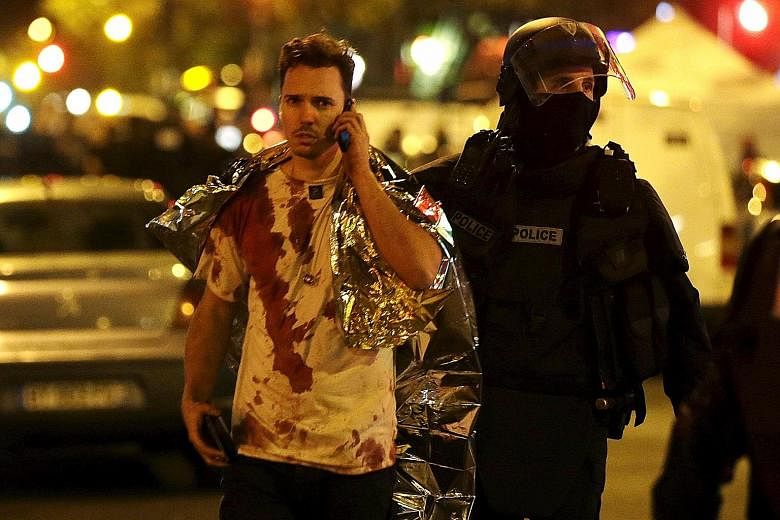Parisians woke up yesterday to an eerily silent and tense city, after a night of terror with a series of coordinated gun and suicide bomb attacks at popular nightspots that left at least 128 people dead and 300 others injured.
Eight of the attackers died, seven by suicide blasts.
President Francois Hollande blamed the Islamic State in Iraq and Syria (ISIS) for the attacks, declaring three days of national mourning, and said that military troops would patrol the capital.
France remained under a nationwide state of emergency.
"It is an act of war that was prepared, organised and planned from abroad, with complicity from the inside, which the investigation will help establish," Mr Hollande told the nation from the Elysee Palace.
Mr Hollande did not specify what intelligence pointed to the militant group's involvement but ISIS claimed responsibility for the attacks, saying they were designed to show that France would remain in danger as long as it continued its current policies.
It was a clear reference to French air strikes in Syria and Iraq.
Much about the attacks was still not clear by late yesterday, including the identities of the eight attackers; whether any accomplices remained at large; and how a plot of such sophistication and lethality could have escaped the notice of intelligence agencies, both in France and abroad.
With little known, the palpable sense of fear among Parisians was understandable.
Major attractions were shuttered, from Disneyland in the east and the Eiffel Tower in the centre to the Chateau of Versailles in the west, and its picturesque squares and avenues were eerily quiet. Sporting fixtures were cancelled on the orders of the city or national authorities.
Schools, museums, libraries, sports halls, swimming pools, tennis courts, food markets and district town halls were also closed.
Usually a bustling centre of traffic, the Gare de l'Est train station was subdued at around 7.30am, with only a handful of grim-looking residents using the Metro trains or the buses at the terminal outside.
Even fewer travelled into the city via the regional trains, most of which were largely empty.
Those who braved the public transport encountered police barricades and closed Metro train stations near the six locations where the horrific attacks took place.
Barricades and police vans blocked the vicinity near the Bataclan theatre, site of the worst carnage where more than 80 people attending a concert were gunned down.
"I had wanted to open my souvenir shop, to show that life goes on as normal," said Mr Guy Blatt, 52. "But they've closed the road, so I can only go home and wait until it's safer."
French media reported that there were queues of people wanting to donate blood at hospitals. Medical officials have asked for people to space out donations, over the weekend and throughout next week.
No reports of Singaporeans directly affected by the attacks have emerged but the primary concern for those visiting Paris was getting out of the city conveniently, especially after Mr Hollande ordered the closure of borders.
Said Mr Ken Low, 33, a project manager on a business trip in Paris: "I hope when I leave the city on Sunday, it will be smooth-sailing at the airport."
World leaders were unanimous in condemning Friday's terror strikes. US President Barack Obama described them as "an attack on all of humanity and the universal values we share", while President Xi Jinping, in a phone call to his French counterpart, said that China was ready to join France and the international community in stepping up security cooperation and combating terrorism.
Prime Minister Lee Hsien Loong expressed shock in a Facebook posting.
Mr Lee, who is attending the G-20 summit in Antalya, in Turkey, beginning today, said a planned discussion about terrorism at the meeting was "more relevant and urgent than ever".
He said: "Each time it happens, we again feel appalled and outraged beyond words, for an attack like this is in fact an attack on our shared humanity."
READ MORE
ISIS claims responsibility for attacks

